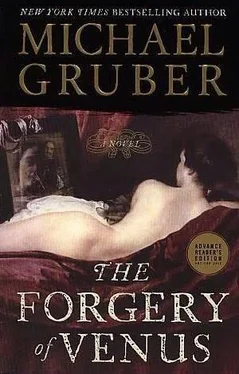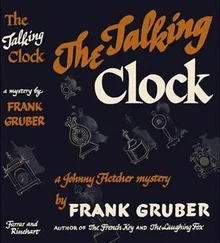“You do and I’ll kill you myself,” said his wife.
Ileft Bosco and took a sharp left onto Eleventh Street and into a sour depression. Okay, he’d found one of the last few sore spots in the culture and stuck his blade in there pretty good and paid the price. He’d literally suffered for art, which was supposed to be part of the deal, but it wasn’t a deal I was ever interested in. What I wanted was…What I wanted was…
It struck me that I didn’t know. That was strange. In the what-I-really-want section of my brain there was a dusty shelf with nothing on it. Instead there was a longing.
Thinking this shit and walking down the via negativa this way, I found myself in Gorman’s, where I drank away the evening under my silly painting of Hillary. I fell into conversation with a fellow who said he was an unemployed philosophy teacher, and we talked about the nature of reality through a serious number of rounds and then staggered out into the glowing dark of the city. He needed a cab and said he’d drop me off at my place and he hailed one and…actually I can’t recall the tail end of the occasion very well. I remember Wittgenstein and “the world is whatever is the case,” and the cab, but I don’t have any memory of getting out of the cab and walking up my stairs, which has often served to burn a lot of alcohol out of my system. I do remember waking up.
I wasn’t in my bed but in a king-size item with sheets far finer and cleaner than mine, looking up at a ceiling higher and cleaner than the one in my loft. I had a brief and ridiculous thought that I’d been seduced by the unemployed philosopher. I called out; nothing. Whereupon I rose carefully, so as not to move the spiked thing in my skull, and cast around for the bathroom.
Someone had spent a lot of money here, all the latest European fixtures and a huge glassed-in shower enclosure, quite a gap between it and my old tin job up on stilts, with its mildewed curtain. I washed my face and opened the medicine cabinet, looking for aspirin; I found a bottle of Advil, took three, and checked out the rest of the stuff there. The usual, and I learned from the high-end makeup and face treatments that a woman also lived in this place, but when I examined the amber drug vials I got a shock: one of them was for amoxicillin, and the name on the label was mine.
I recalled that I’d had the vial for nearly a year, since the cough I picked up last winter, and yeah, it was the same vial, with about the same number of residual pills and the smear of blue paint on the cap. So the little quivers were starting up around the heart, and the higher brain parts were thinking explanations: maybe I lent it to someone and forgot about it, and he lent it to someone else, et cetera, and it ended up here. I put it back and went out into the loft and looked out the window. As I’d expected I was in Tribeca; I could see Greenwich Street and a slice of shining river, so I was probably in one of the elaborately gutted and rebuilt loft buildings catering to media stars and the upper crust of the art world.
Running along under the window was a long painted shelf full of family photographs, and I glanced at them casually, as one does with the photographs of someone else’s family, and then looked at them again, and looked at them again, each one, and now my heart was really pounding, and fat drops of sweat burst out all over my face because it was my family in all the pictures, mine and Lotte’s, my dad in his jaunty cape, and my mother when she was young with her two children in our best white outfits, and Lotte’s parents and her grandparents from old Europe, all photographs I’d seen throughout my married life. And others were strange, for example me and Lotte, somewhat younger, on what was apparently the Great Wall of China, a place we’ve never been. That I can recall.
I went exploring on wobbly legs. Bedrooms for the kids, and in them I recognized a lot of their gear-although Milo had a better computer than he does in real life-and Rose’s room with her stuffed animals and a big corkboard for her drawings.
The huge living room held a good collection of contemporary art on the walls, including one work by Wilmot, Jr., that painting of Lotte and Milo I’d given her for our fifth anniversary, plus comfortable, expensive furniture, a great black piano lurking in the corner, shiny, hideous; the kitchen all à la mode, granite counters, Sub-Zero fridge, with pictures of my kids, their school stuff magneted up there, the Vulcan range, Lotte’s stained and worn cookbook on its stand on the counter.
So then I thought, This must be a drug thing, some strange reaction to the drug, like the Velázquez, but no, it was entirely different because in those I was Velázquez, at ease in himself, and here I was just me, pissing myself in terror.
But I had to see it all, so I followed my nose, chasing the turpentine scent to a door, and when I went through there was the studio, skylighted, spacious, with a big oak Santa Fe easel smack in the middle with the latest by the supposed me on it. I seemed to be doing groups now, a big one, maybe four by six feet. This was of four people, three women and a man, on a rose madder-colored velvet love seat, all slumped to one side, limbs entwined like they’d all stumbled and fallen down in a heap of beautifully painted and glazed pink limbs, slick Barbizon-style surface, invisible brushstrokes, good as Bouguereau any day. The faces were clearly recognizable: Suzanne and Lotte and my mother, all in the full bloom of their youth, and the man was Dad. It was unspeakably more horrible than the family photos. I ran out of there without another look.
Elevator down to the lobby, and this was indeed a fancy building renovation rehab because there was a real lobby, not the usual loft building hallway: it had potted plants and indirect lighting and a little desk for the doorman. Who greeted me cheerfully: “Hi, Mr. Wilmot. Looks like we gonna have a nice day.”
He was a short, dark man in a gray uniform, labeled AHMED on a chromed pin. I approached him and said, “You know me?” and my tone and face must’ve been something else, because his formal smile jelled and he answered, “Sure, I know you. You’re on the top front. Mr. Wilmot.”
“How long have I been living here?”
“I don’t know, sir. I been here six years and you were here when I got hired. Is there something wrong, sir?”
I left without responding to this inane question and took off, and in a little while I was running up Broadway and I didn’t stop until I got to my loft building. The street door was propped open, which was unusual, but people sometimes did it when they were expecting deliveries. I ran up the stairs to my loft and stood in front of my loft door.
Only it wasn’t my door. My door has the original battleship-gray paint with a universe of old chips and stains I know like the palm of my hand, and the door I was gaping at now was new and painted a cheery cerulean blue, and it had a brass cardholder and an engraved card stuck in it bearing an unfamiliar name. It took me a while to push my door key in the hole, my hands were shaking so badly, but in any case the key wouldn’t turn. I pounded on the door until I skinned my knuckles, but there was no answer.
So I went down the stairs to Bosco’s, not running anymore, but slowly, like if I moved fast now the world would shatter. Bosco’s door was painted shiny red. Bosco was still in the hospital, but I knew that Connie had moved in so she could be in town while he was recovering. I knocked. The door opened and there was a tall, athletic black man standing there, looking at me inquiringly.
“Where’s Connie?” I said.
“Who?” said the guy.
“Connie Bosco. This is her husband’s loft.”
Читать дальше












